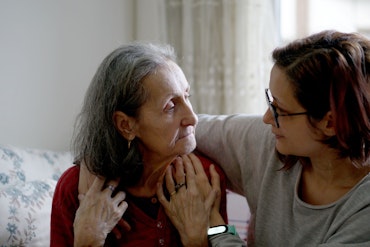Researchers seek smoothie solution to the aged care weight loss problem
Researchers may have identified how to help Australians in aged care homes maintain healthy body weights
![<p>Some older Australians in aged care homes may be at risk of unexplained weight loss but researchers are working to address this. [Source: supplied]</p>](https://agedcareguide-assets.imgix.net/news/articles/wp/eatingpink1707.jpg?fm=pjpg&format=auto&w=550&q=65)
Some older Australians in aged care homes may be at risk of unexplained weight loss but researchers are working to address this. [Source: supplied]
Article by Chris Deed
Edited by Georgie Waters
Key points:
- Researchers have identified the positive effects of providing older Australians with protein-rich smoothies to maintain healthy body weights
- Following the smoothie trial, more than half of residents either maintained or gained weight, with 11 residents gaining over one kilogram
- Participants in the Pure Food Co study trial also experienced wound healing benefits and an improved sense of well-being
While weight loss may occur in older adults, it’s important to recognise that it is not a normal or expected part of ageing.
As people age, their nutritional requirements may change due to factors such as decreased appetite, reduced physical activity, changes in taste and smell or altered digestion.
However, these changes should not automatically lead to weight loss. Ensuring adequate nutrient intake — with an emphasis on protein — can help prevent issues around unintended weight loss.
Our recent pilot trial demonstrated the significant impact that a carefully designed nutritional program can have on improving the overall well-being of elderly individuals in care. This trial emphasised the importance of providing nutrient-rich meals to support the health of residents.
We partnered with Uniting NSW ACT Sydney Central for a six-week pilot study to address the nutritional needs of its residents. These participants experience weight loss from reduced appetite and challenges with eating due to issues such as dysphagia.
We believed if we got the food and nutrition right, many of these risks would be reduced.
The clinical outcomes demonstrated how modified textured meals and protein-rich smoothies can effectively address both weight loss and weight gain.
By targeting the specific nutritional requirements of the residents of Uniting NSW ACT Sydney Central, the trial highlighted the importance of prioritising protein in modified textured diets of aged care residents to support their weight gain.
The study involved two groups of aged care residents receiving texture-modified meals and smoothies across four Uniting NSW ACT Sydney Central sites with two different nutrition programs.
The prevention strategy targeted residents at higher risk of malnutrition and weight loss. Over six weeks, 30 residents were served nutritious texture-modified meals.
Prior to the study, over half — 55 percent — of the residents had lost weight but within four weeks of being on the program, nearly three quarters — 72 percent — had gained weight.
In the targeted intervention trial, 43 residents experiencing unplanned weight loss received high-energy, high-protein smoothies twice a day — in addition to other meals — that significantly boosted their protein, energy and calcium intake.
Before the study, all residents had been losing weight, with 75 percent continuing to lose weight in the month prior to the program’s launch.
Following the smoothie trial, more than half — 54 percent — of residents either maintained or gained weight, with 11 residents gaining over one kilogram.
The trial faced a setback at one site due to COVID-19 that disrupted smoothie deliveries.
The results highlight the impact of nutritional intervention to address unplanned weight loss and by also focusing on taste and presentation, residents have the opportunity to enjoy the entire experience of eating once again.
This study also demonstrates the intrinsic link between protein and wound healing. Both programs monitored pressure injuries to assess the impact of increased protein on wound healing.
The results were resounding, showing that 100 percent of wounds healed due to enhanced protein absorption from the trial.
The emphasis on protein in the study underscores its importance not only in combating weight loss but also in promoting weight gain in elderly residents in aged care settings. By ensuring correct protein intake through the tailored intervention program, residents gained weight, their wounds healed and their sense of well-being improved.
During the trial with Uniting NSW ACT Sydney Central, clinical teams received training on the importance of nutrition tailored to the needs of the residents and they were educated on the key benefits of the textured modified meals and how these products can make the dining experience less confronting and more enjoyable.
Additionally, extensive training sessions were conducted with the kitchen team to streamline operational processes. Following the trials, Uniting NSW ACT Sydney Central implemented a textured modified meal delivery across 35 of its sites.
By 2050, more than 3.5 million Australians are expected to access aged care services. This will increase the demand for texture-modified foods, which are complex to prepare, putting more pressure on aged care providers, clinical teams and kitchens.
Often staff rely on their food knowledge and training, but many residents need nutritional food for medical reasons, and as the population ages, that may not be enough to sustain an ageing Australia.
About The Pure Food Co:
Pure Food Co is a market leader in the textured-modified food sector. It takes a food science and technology approach to manufacturing ready-made safe and delicious textured modified foods for aged care, nursing homes and hospitals and has partnerships with many of these providers.
All 4,500 meal choices adhere to the International Dysphagia Diet Standardisation Initiative — IDDSI — guaranteeing consistency and reliability at every stage of the food journey.
Chris Deed is a director at The Pure Food Co.























